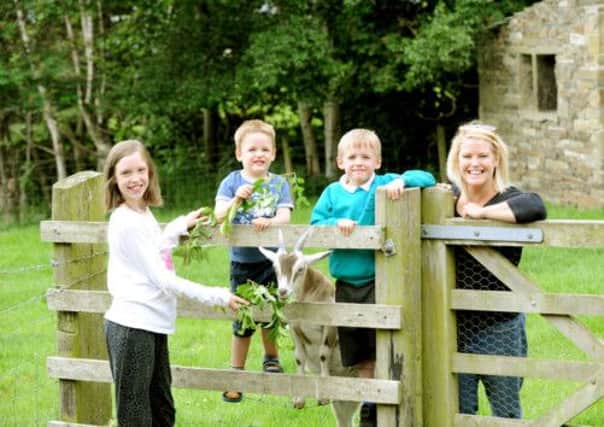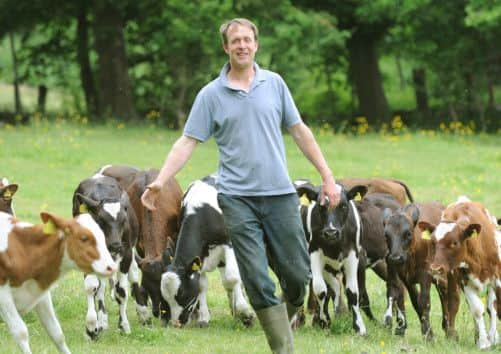Farm Of The Week: Dairy is no drag for the global farmer


According to American politician Newt Gingrich: “Perseverance is the hard work you do after you get tired of doing the hard work you already did.”
Most dairy farmers can’t be accused of lacking perseverance to overcome prices for their milk which barely cover the costs of production and many have taken a hit in the last 12 months as grass growth stuttered and feed costs spiralled in bad weather.
Advertisement
Hide AdAdvertisement
Hide AdPlenty of dairy farmers have had to turn their backs on milk and have diversified but there are still those who continue to persevere out of love for their trade, family tradition and sheer determination.


Malcolm Fewster is one of those farmers. He found a great sense of perspective after being granted a prestigious Nuffield Scholarship in 2010 with sponsorship from the Yorkshire Agricultural Society (YAS). It allowed him to travel to the likes of Chile, Australia, New Zealand, France and Ireland and witness how different farms operated and he says he’s emerged with a renewed confidence in the important role smaller farms play in food production.
Malcolm and his wife Cheryl, in partnership with his parents, Malcolm and wife Trees – a Dutch name – run Listing Mill Farm in Gomersal, West Yorkshire, over 100 acres of land. Their dairy herd of 95 cattle produce milk for Arla. Cheryl, who hails from Brisbane, Australia, takes charge of the paperwork while Malcolm tends to the cattle with his father.
Reflecting on the scholarship, Malcolm says: “We met in Washington, USA, to look at different sectors from mushroom growers to Amish farms. Everyone came away from it with new perceptions. I got a strengthened opinion that smaller farms can make a very valuable contribution to agriculture and shouldn’t be written off but should continue to be the base of food production around the world.
Advertisement
Hide AdAdvertisement
Hide Ad“Smaller farms are more resilient. The Amish farms highlighted that to me even though they’re using antiquated methods. The Amish community is actually growing in Pennsylvania even though they aren’t allowed to increase land sizes and they have to introduce new generations to maintain enough time for family and religious purposes.”
Malcolm has his own family life to enjoy on the farm and downs tools at mealtimes to sit down with Cheryl. The couple met in Australia on the back of a relationship between their siblings and Cheryl, who had been working as a forklift truck driver on Brisbane’s docks moved to the UK in 1998. Four years later she moved to the farm and by now her Oz accent has taken on a Yorkshire twang. They have three children, Millie, aged ten, Renton, six, and Trevor, four.
Malcolm’s love of the land is obvious. Driving us around undulating fields he stops at a specific spot to show me where foxgloves are starting to flower and a duck’s nest. He’s left a bowl of water out for the duck and bits of pipe as a hiding place in case a fox takes an interest.
A specific change has been made to Malcolm’s livestock on the back of the scholarship.
Advertisement
Hide AdAdvertisement
Hide Ad“I changed the genetics of my herd from relying entirely on New Zealand Friesians to artificially inseminating them with Swedish Reds. I went to Moorepark Farm in Ireland and found they were a good cross with a New Zealand style cow with the potential to improve udder health and add hybrid vigour.
“One of the reasons I did a scholarship was I was interested in cheese making so I looked at diversification. In Australia I spoke to a farmer who made Mediterranean cheeses and rented cows to his neighbour. Making cheese would be a way of making money but it’s not something you can do lightly. It’s still an idea.
“We have a catering facility on the farm that my sister used to have. If the right person came along to make cheese out of our milk there’s a place for them to use.”
“The main positive for myself is that I’m confident I have a viable future on this farm. A lot of farmers are scared of not growing but as a dairy farmer you can maintain your livelihood as long as you handle your costs right and keep chipping away at the cost per litre.
Advertisement
Hide AdAdvertisement
Hide Ad“A lot of farmers pack up dairy and say it’s the best thing they have ever done. I love dairy. It’s about managing your own system, so it’s not a daily grind in the pursuit of profit. The profit driver on my farm is utilising the pasture in a spring calving system.
“The problem is that the whole industry is geared towards investment. Not many people are looking at how they can make the process better with what they have got. People are driving for higher yields and taking a hit on margins per litre. It suggests we have lost some resilience in the industry if we are relying on a high milk price to make profit.”
Malcolm believes he’s adding value to his milk by raising his cattle on a strict grass diet. Dairy products from grass diets are understood to provide health benefits as they have been found to contain a potent nutrient and fatty acid known as conjugated linoleic acid. Malcolm uses low-cost rotational grazing techniques to protect grass quality and manage his herd’s diet.
“All it takes is for one supermarket to start looking for milk from grass and there will be a search for suppliers,” he said.
Advertisement
Hide AdAdvertisement
Hide Ad“I’ve almost got to a stage where I feel I have a moral obligation to do something with my milk. Why should I be the sole beneficiary of my farm?
“It’s making that product available as well as being proud of the way I’m farming in the knowledge we have a decent product there, and that’s what Nuffield does for you; it gave me the confidence to do what I wanted to do, take the right decisions and be happy with them.”
Away from the farm, Malcolm is a member of the management team of the YAS’s Future Farmers of Yorkshire group. It next meets at the Pavilions of Harrogate on Tuesday[June 25] at 7pm when potential Nuffield Scholarship applicants have the chance to hear from past scholars about their experiences.
To book a place, email elizabeth@yas.co.uk